I was always mystified by the somewhat strange quiet and almost eerie tranquility of a certain village on the East Coast of Demerara, and wondered why there was never the bustle of residents in the street, the boisterous laughter of males around, or the womanly laughter of gossiping housewives renting the air with their shrill, merry strains.
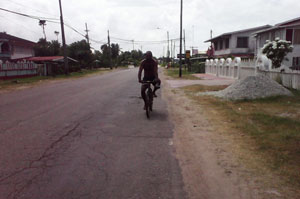
Each time I passed this village, it seemed to be sleeping in misery, as if desperately hoping for a new era to arrive to bring it to life, with hopes of getting it to exude the customary bustle and fuss like many other villages.
Nooten Zuil is located some eighteen miles from the city of Georgetown and to date according to reliable sources, has a population of just over 2,000.
Well my curiosity got the better of me and I decided to explore this settlement many years after, which really is actually just recently.
So there I was aboard a mini-bus which sped dangerously along the East Coast Demerara Highway, taking steep turns with an alarming squeal of tyres and sickening screeching of the brake pads. I was headed for the somewhat pristinely dormant village of Nooen Zuil, which I felt was just too quiet for comfort.
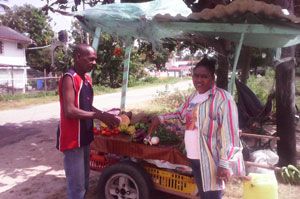
Deemed one of the quietest villages on the East Coast of Demerara by residents living there, Nooten Zuil is one of those settlements which have a fruit tree in every yard, a hammock under every tree and a kitchen garden in almost every home. Sandwiched between the villages of Belfied to the west and Hope to the east, the first thing that greets one when entering Nooten Zuil is its tranquility. There is a sense of peace in the village, interrupted only by the occasional sound of vehicles traversing the public road.
Residents of the mixed village said that it is so quiet that they feel it is being constantly overlooked by those that are supposed to be tasked with its smooth existence. One resident jokingly said the village should be named ‘Land of the Forgotten’ because nothing of major interest ever happens there, and as such the village is not remembered by many.
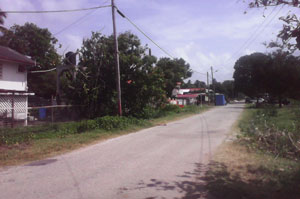
The main occupation of the inhabitants is rice and cash crop farming, although some of the residents have over time began erecting small shops in the village to sell groceries and a few household items.
Nooten Zuil in times gone by
Today Nooten Zuil is a bit modern in appearance, but certainly is lacking in infrastructural features and and the sophisticated factors of life would deem it a hit number on our ‘Villages Calendar.’
Bursting with curiosity as to why the village has always exuded this forlorn appearance, I was directed to an elderly farmer, Fazil Alli who smiling reminisced on his days in the village as a young boy.
“In my time this village was just like waste land. The few people that lived here would loose their many cows and sheep in the wide open pastures and let them graze their fill. There were no shops and stores and boutiques like some villages and the village was quite muddy and watery in several areas.
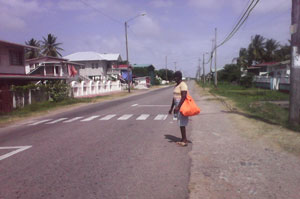
Being close to the Atlantic Ocean we were flooded out many times and the drainage in the village at that time was terrible. During that time we had to travel sometimes outside the village to get good drinking water and supplies for the kitchen. Most of the houses were thatched and shingle roof structures and the only road in reasonable condition was the one that ran through the village. As I grew older things changed a bit and more houses began to pop up. Persons built and leveled their lands to avoid flooding, and things are what you see here today”.
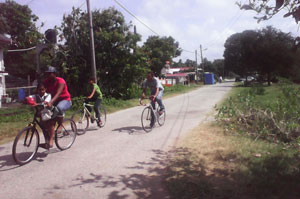
A distinct old world aura still clings mystically to this village, and coupled with the deep tranquility that is there, Nooten Zuil holds a strange mysterious intrigue, which I found a bit unnerving. Today there is just a smattering of shops, one lone boutique, and there are no popular nightclubs or hot points in the village to offer entertainment for villagers. And lacking also is proper recreational opportunities for youths in the villages. While the village shows signs of developing, villagers are of the view that the impending development is too slow for comfort.
Single woman yearns for help
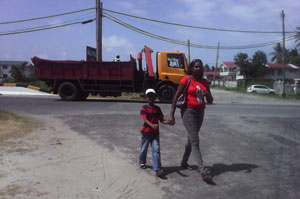
To come by ready jobs in the village is quite a task since there is hardly any scope for employment besides farming. And vegetable vendor ‘Kemwattie’ was feeling the blunt force of this constraint as she sat beside a small table with vegetables and ground provision, hoping for a sale.
“Sir, nothing nah really ah guh on hea in dis village. Things hard dese days and business really slow. Me an wan poor single parent and me ah beg lodging wid me sista. Dem give me wan room and ah give meh lil food. Me still ah try wid this lil stall hea but me ah experience stiff competition frum dem bus and van wah ah come in de village fuh sell vegetable and ground provision. Someday me barely ah mek two sale and dem nah get no otha wuk anywhea else”.
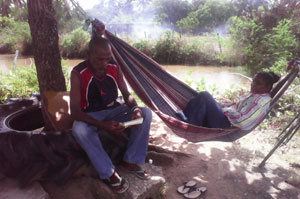
Kemwattie sits daily beneath a tree by the roadside as she yearns for sales in an arena where the competition sets her at a great disadvantage. Sales for her were excellent during the Christmas season last year, but after that things just went haywire.
The ‘labba’ speaks
Anand Beharry more popularly known as ‘Labba’ too is plagued by the employment problem in the village. While his job as a carpenter is seasonal, he claims he cannot seem to find anything else in the village to do since there is not much to do as job professions there.
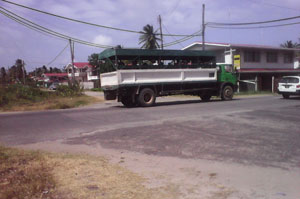
“Everybady hea know me as ‘labba’ and me is labba by name and nature. I believe in surviving honestly and as such like the labba would do, me does lap up every available opportunity to get ah jab in dis village. But bai dem nah get much wuk hea… De village small and if yuh nah get land fuh farm, yuh doom…. We nah get fancy shops and dem thing here to offer jobs, and suh it hard because most ah dem jabs at dem suga plantations full up. Bai me does tek an dis thing suh much, it ah cause me fuh drink nuff rum when de day come. De cast ah living really hard bass…..”.
Challenges
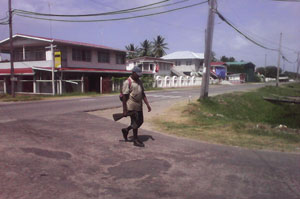
Speaking of the challenges in the small village was housewife Seeta Ramnarine who operates a small shop in front of her home. While her small shop brings in an extra dollar to make life a little more comfortable, she is particularly concerned with a few challenges she claims villagers are faced with.
“Yes we all agree dat Nooten Zuil is a quiet and peaceful village, but at times meh does think dat de entire world fuget we…. Look for instance, some areas in dis village still ah flood during rainy season, and the NDC representative hea more concerned wid breaking down dem small shaps people ah put up fuh survive, dan wid cleaning de village properly. We need ah ball field hea and we nah even get a sports club, nah even wan disco or nutting. Dis place just dead. It like if yuh ah live in wan grave yard. Everybady fuget we and nah ah look in we direction”.

Seeta is of the view that the relevant authorities need to pay much more emphasis and focus on their existence, and intensify efforts to give the village a ‘modern make over’. She also feels that the village should have its own health centre and a variety of educative institutions. Her sentiments were shared by several neighbours.

She did however mention that some villagers have resorted to the sale of scrap iron to bring in a fast dollar, but explained that because of their small environs, there is not much of that precious metal around. Some villages explained that there is need for some access streets to be properly maintained and for new features to be implemented to showcase the village as a whole.
A comfortable life after sufferings
Ever so often we meet people that are enjoying the luxuries of life and marvel at their success or turn green without envy, without even pausing to think of their prior suffering.
The story of well established rice farmer, ‘Pertab’ should be a lesson to all that great success is always assured after hard work, suffering and sacrifices.
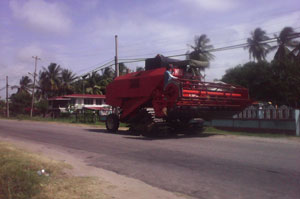
“Boss today I am enjoying a very comfortable way of life but I had to work really hard and endure a lot before I get to this level. As a young boy, and coming from a family of seven, things were really hard since my family were poor. I can remember days when we had to eat salt and rice with eschallot and a little oil when there was nothing to cook. Many times we missed school because there was no money for transportation, and when we did attend there was no an extra penny to purchase a snack like other kids. Some of us went to school in rubber slippers or no footwear at all.

Yes, we were ashamed and were taunted by students that were better off, but my mother always encouraged us with tears in her eyes as she did her best to give us food with the help of my father who was a rice farmer also. My father taught us to save every spare penny since it grows in time and that was a good lesson learnt. Myself and my older brother began working in our early teens to help out in the home and saved our earnings as mother directed. Soon we extended the home and soon bought some land and expanded our rice farming. As the years went by we saved in a commercial bank and were able to build a lavish home and enjoy comfortable living as we are doing today. Nothing good comes without disappointments and suffering….”
Pertab reflected on instances when they were forced to eat ‘fowl guts’ cooked into various stew types at Christmas season while the air was filled with the aroma of cakes, chicken, and other delicacies that were being prepared by some neighbours.

He explained that at times they had to make their own toys from pieces of wood and other materials, while their mother had to ‘turn over’ and use the same curtains year after year at Christmas. He said some times his father would catch a small alligator in the rice fields and his mother would cook the ‘alligator tail’ in a nice smelling curry that somehow never managed to change the stark whiteness of the meat.
Prominent figure
A much celebrated figure who traverses between Lusignan and Nooten Zuil was Nazeer Khan a/ka Mighty Roger who was a renowned calypsonian, dance instructor and cultural enthusiast in his time.
Today he still continues to keep the East Indian culture alive in villages along the East Coast and just recently hosted a three nights Phagwah Mela in the nearby Lusigna that was attended by hundreds of individuals.
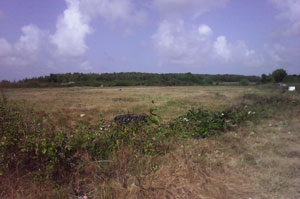
His journey into the arts began in 1974 when he started out as a talented Indian Classical and Kathak dancer at the National School of Dance. There he surprised man by doing the dance disciplines of ballet, African pieces with instructor ‘Edward ‘Shaft’ Lashley who taught him the dance styles of Amerindians.
With his vast reservoir of experience he choreographed an excellent ‘ethnic fusion’ that showcased all the different dance styles and soon formed the People’s Cultural Corp in 1975 with talented Guyanese countrywide. This group excellently told the tale of the rich Guyanese folklore through dances in schools and other institutions around Guyana.
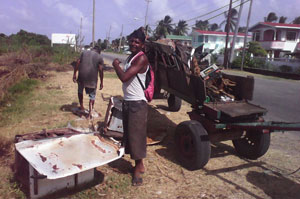
Soon after he branched into the calypso field and performed with celebrated faces like Calypso Stella, Lord Canary and may others, where he did back up singing. Then soon after a calypso enthusiast composed a piece dubbed, ‘The lying Teacher’ and gave him to perform and he thrilled the many that watched his performance. He placed second in the Calypso Competition with this entry in 1977.
Today while he is not dancing or singing as before, he owns the ‘Mighty Roger Taxi Service’ and operates from Lusignan, but still remains active in schools as he promotes the East Indian culture.
Conclusion

Villagers may say that Nooten Zuil is the land of the forgotten, but if I may, I certainly beg to differ. For me it’s a quite striking and quiet village with pleasant residents that add to its simple lustre. And its not so bad after all because I did manage to visit the lone San City Chinese Restaurant, the Western Union and Bill Express outlets, and even dropped in at the Triple ‘D’ Original Boutique and Rentals.
I would say with some good sprucing up and alterations, Nooten Zuil can hold its own against many other well established villages. One thing for sure is that should you visit the village, you will enjoy the fresh, crisp Atlantic breeze that would do wonders for the lungs.
Join us next week when we take a ride to the breath taking Unity Village which has produced some of our best stalwarts and sportsmen of the century.
By Alex Wayne



.jpg)








